| |
WW1
Soldiers database
8th
Index
WW2
Soldiers database
Street Directories Menu
|
Belfast
Telegraph
__________________________________
74th
Year
Tuesday, June, 6,
1944
Three-Halfpence
I
N V A S I O N |
|
An official communiqué
states :
Under the command of General Eisenhower, Allied
naval forces, supported by strong air forces, began landing Allied armies
this morning on the Northern coast of France.
Airborne landings were carried out. The
naval bombardment went "in the manner planned."
The German news agency says the airborne
landings in Normandy were made in great depth.
Minesweepers swept the way into the coast and
bombarding ships got into position to engage coastal batteries.
The landings took place between 6 a.m. and 8-15
a.m.
The Allied "alert" call has been
sounded in Holland, Belgium, France and Denmark.
His Majesty the King will broadcast at 9 p.m.
to-day.
Massed airborne landings have been successfully
effected behind enemy lines.
HERE IS THE INVASION
COAST NEAREST ENGLAND IN DETAIL.
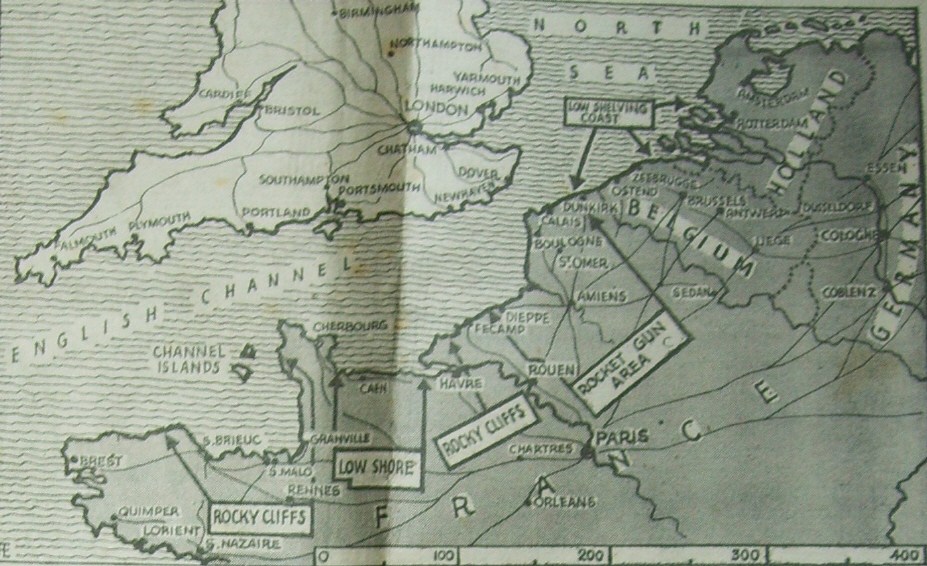
|
|
The following
is the full text of the Order of the Day issued to-day by General
Eisenhower to each individual of the Allied Expeditionary Force :
"Soldiers,
sailors, and airmen of the Allied Expeditionary Force.
"You are about to embark upon the great
crusade towards which we have striven these many months.
"The eyes of the world are upon you.
The hopes and prayers of liberty-loving people everywhere march with you.
"In company with our brave Allies and
Brothers in Arms on other fronts you will bring about the destruction of
the German war machine.
"The elimination of Nazi tyranny over the
oppressed peoples of Europe and security for ourselves in a free world.
"Your task will not be an easy one.
Your enemy is well trained, well equipped, and battle hardened. He
will fight savagely.
"But this is the year 1944. Much has
happened since the Nazi triumphs of 1940-41. The United Nations
have inflicted upon the Germans great defeats in open battle, man to man.
"Our air offensive has seriously reduced
their strength in the air and their capacity to wage war on the ground.
"Our home fronts have given us an
overwhelming superiority in weapons and munitions of war and placed at
our disposal great reserves of trained fighting men.
"The tide has turned. The free men of
the world are marching together to victory.
"I have full confidence in your courage,
devotion to duty, and skill in battle. We will accept nothing less
than full victory.
"Good luck and let us all beseech the
blessing of Almighty God upon this great and noble undertaking."
The Order was
distributed to assault elements after their embarkation.
It was read by commanders to all other troops in
the Allied Expeditionary Force.
Broadcast to Europe
General Eisenhower, broadcasting to Europe, said :
"All
patriotic men and women have their part to play in the achievement of
final victory."
He
instructed resistance movements to follow the instructions they had
received.
"Patriots not members of organised resistance groups, continue your
passive resistance, but do not needlessly endanger your lives.
Eisenhower to France
"Citizens
of France :
"I am proud to have again under my command
the armed forces of France.
"Because the initial landing has been made
on the soil of your country I repeat to you my message to the peoples of
other occupied countries in Western Europe - follow your
instructions."
After warning against a premature uprising of the Patriots, General
Eisenhower declared: "Be patient! Prepare!"
"As Supreme Commander of the Allied Expeditionary Forces there is
imposed on me the responsibility of taking all measures necessary for the
prosecution of the war."
Appealing for prompt and quick obedience, he said that the effective Civil
Administration of France would be provided by Frenchmen. All
citizens should continue in their present offices.
When France was liberated Frenchmen themselves
would choose the form of government under which they wished to live.
"Those who have made common cause with the enemy or betrayed their
country will be removed.
"In the course of this campaign for the
final defeat of the enemy you may sustain further loss and damage.
"Tragic though that may be, they will be
part of the price of victory.
"I shall do all in my power to mitigate your
difficulties and hardships.
"The heroic deeds of Frenchmen who have
continued the struggle against the Nazis and their Vichy satellites have
been an example and inspiration to all of is.
"This is the opening phase of the
campaign. Great battles lie ahead. I call upon all who love
freedom to stand by us.
"Together we shall achieve victory"
ROOSEVELT IN TOUCH
Washing, Tuesday - President Roosevelt is being kept informed of
developments, according to an unofficial White House source.
Mr. Elmer Davis, Director of the Office of War
Information, came to his office and stood by waiting for news from Allied
sources.
The War and Navy Departments' night staffs held
off a barrage of telephone callers with the statement : "No
confirmation, no denial, no comment." - Reuter.
GERMANS FALL BACK FROM 5TH
ARMY
No Line for 150 Milles
Fifth Army troops across the Tiber are pressing on beyond Rome close
behind the Germans retreating up the three main roads to the north -
Highway I, II and III, cables David Brown, Reuter's special correspondent
at Allied advance headquarters, last night.
Kesselring's forces are falling back towards
Viterbo and Terni and along the Tyrrhenian shore. Their jammed
convoys are paying a fearful price, as far as 50 and 60 miles north of
Rome. Allied fighter bombers are meeting out terrific punishment to
them, leaving burning and wrecked vehicles sandwiched bumper-to-bumper
between wrecked bridges and bomb craters.
The Germans now have no impressive natural
defence line for another 150 miles - the historic Apennine ramparts
stretching from coast to coast between Pisa and Rimini. But the
whole way back is roughly comparable to the rugged country through which
the 8th Army has been driving the Germans for the past fortnight.
ADRIATIC POSITION
There are still no signs of the Germans pulling out on the Adriatic, but
their east coast positions are becoming increasingly hazardous as the 5th
Army extends its control along Highways IV and V radiating from Rome to
the Adriatic.
Reports from Rome reaching Advanced Headquarters
late to-day indicate that the Germans have blown up communications, but
other utilities, such as the water supply, are still functioning, and the
damage to the buildings is not great.
The 8th Army's advance in the past week has
covered 25 to 30 miles despite the Germans' grand-scale demolitions and
rearguard actions. The fall of Rome, with its enormous political and
psychological reaction to the Axis, is the culmination of a steady 25 day
advance in which General Alexander's armies smashed, demoralised and
rolled up Kesselring's formidable South European defences.
ATTACHED FROM AIR
R.A.F. Wellingtons flew out last night to attack Terni, important road
centre 40 miles north-east of Rome. Their task was to crater and
block the roads which meet here, including Highways III and IV. A
square and street junction at the southern end of the town were the
targets. They were clearly identified and a heavy concentration,
including block-busters, was placed round the road junction and river
bridge.
One crew claimed that a 4,000-lb bomb scored a
direct hit on the bridge, while two sticks of bombs fell across it.
SAW BATTLE
General Alexander, standing in front of his war maps at his headquarters,
discussed with Mr. Peter Fraser, Prime Minister of New Zealand, the
strategy and progress of the campaign during the latter's visit to the
Italian front, says an official New Zealand war correspondent.
At Sora, north of Highway VI, Mr. Fraser saw the
battle for Italy in progress from the front line itself - Reuter.
TRANSPORTS DESTROYED
F.
Reynolds Jones, Reuter's special correspondent at Allied
Headquarters, Mediterranean, on Monday cabled that fighter-bombers
attacking north of Rome found German highway traffic relatively light,
although by mid-afternoon they had destroyed at least 150 transport and
damaged many more.
CITIZENS CELEBRATE
Ralph Howard, N.B.C. commentator, in a broadcast on Monday afternoon said
:-
"Rome is filled with British, American and
French soldiers marching or driving through the crowded streets in pursuit
of the Germans.
"One thing is outstanding as you drive
through the city : Rome has been left untouched.
"Since early morning the citizens have been
out in the streets waving flags and welcoming our troops.
"Here in Rome it is a holiday and everyone
is having a good time," - Reuter
SOMEBODY ELSE ON BALCONY
ROME, Monday - Mussolini's famous balcony on the Palazzo Venezia had a new
occupant to-day.
He was a private who came from Brooklyn, home of
thousands of Italian-Americans.
He climbed up on the balcony and in Mussolini's
old spot told the people of Rome exactly what he thought of the previous
occupant - British United Press.
GERMAN SEEKS SANCTUARY
The German Overseas News Agency states :
"The German Ambassador to the Vatican, von
Weizsaecker, has moved into Vatican City.
"He received instructions to remain in
Vatican City in all circumstances.
"The other diplomatic missions of the
Tripartite Powers will also take asylum in the Vatican."
SPEEDING UP CHASE NORTH
OF ROME
Entire Tiber Bank Ours
Allied forces fanning out beyond Rome are to-day speeding up their drive
to catch up with the main German armies reeling back under the hammer
blows of Allied heavy and fighter bombers.
SWEPT THROUGH TOWNS
They have swept through seven Italian towns in the German right flank and
Field-Marsha Kesselring, according to Paris radio, has abandoned the port
of Ostia as well as the entire bank of the River Tiber from Rome to the
sea.
2,000 VEHICLES DESTROYED
About 2,000 German vehicles have already been destroyed or damaged in the
battle area of Northern Italy in the great air strafe by R.A.F. and
American planes.
A fleet of 500 Allied heavy bombers has been
flung in to smash the retreating Germans, it was officially disclosed
overnight.
ALEXANDER'S COMMUNIQUÉ
To-day's communiqué from Italy states :
"Army - With the capture of Rome the
Allied Armies in Italy have brought another phase of the campaign to a
most successful conclusion. The battle to destroy the enemy
continues without pause.
"Troops of the 5th Army are now crossing the
Tiber at many places and have advanced some five miles beyond.
"Only weak resistance is being encountered
at present in this sector.
"Air - Tactical aircraft concentrated
their attacks yesterday on lines of communication leading to the battle
zone.
"Medium bombers struck at a number of road
bridges in West and Central Italy and north of Rome.
"Fighter bombers attacked rail-road bridges
and trucks, motor transport, and ammunition dumps in the same area.
Medium forces of heavy bombers carried out attacks against rail
communications in Northern Italy, bombing yards at Ferrara, Castel
Maggiore, Bologna, Faenza and Forli, as well as several bridges.
"Aircraft and installations on aerodromes in
the Po Valley were attacked by fighters.
"During the day's operations four enemy
aircraft were destroyed. Thirteen of ours are missing.
"Eight enemy aircraft were seen by our
aircraft over the battle area in daylight.
"Mediterranean Air Force flew approximately
2,400 sorties.
"On Monday night our bombers attacked
objectives in the Viterbo area,"
ULSTER CALL TO PRAYER
Issued by Bishop
The Bishop of Down and Connor and Dromore (Rt. Rev. Charles King Irwin,
D.D.), has asked all clergy of the Church of Ireland to make immediate
arrangements for prayer and intercession in their churches to-day at their
own discretion and according to the conditions existing in their parochial
areas.
St. Peter's Church, Antrim Road, Belfast, and
other parish churches in the city will be open all day, and at St. Peter's
there will be prayers at each house, beginning at noon.
THE ICELANDIC REPUBLIC
British Ambassador
The King has approved the appointment of Mr. E. H. G. Shepherd as his
special Ambassador at the inauguration of the first President of the Icelandic
Republic on June 17, states the Foreign Office.
Mr. J. Chrisymas Moller, chairman of the Danish
Council, said at Denmark Constitution Day meeting in London yesterday
: "The Danish people would have preferred a postponement of the
final decision regarding the separation till after the liberation of
Denmark, but I do not think there will be bitter feelings between the two
peoples." |
Reuter's
Military Correspondent learns that Hitler is taking personal command of
all anti-invasion operations.
He is surrounded by a staff including four
marshalls, and is believed to have moved his head quarters to a place
somewhere in Northern France.
4,000 TRANSPORTS
CROSSED, so says Churchill
Announcing the landings on the European Continent, Mr. Churchill said in
Parliament.
"An immense armada of upwards of 4,000 ships, with several thousand
smaller craft, have crossed the Channel
_____________________
WEATHER WASN'T VERY KIND
A Special Correspondent
Says :-
The
weather was not very kind on the Continent to the enormous convoys, and
there may have been some seasickness.
The German naval opposition will probably be
negligible, though the E-boats may be a nuisance.
The naval bombardment went "in manner
planned." First reports are therefore good. U.S.
battleships took part in the bombardment, it is learned.
The underwater obstacles have been a serious
difficulty in the planning. If we chose high tide we might run into
them. If we went in at low tide we would have to face the long
beaches.
The German divisions are believed to be pretty
thin on the ground in the coastal areas.
Montgomery In Charge
The
first stage in the liberation of Europe began early this morning when
Allied Armies started to land on the Northern coast of France, says W. E.
West, Press Association correspondent at Shaef.
General Montgomery is in charge of the Army group
carrying out the assault. This Army group includes British, Canadian
and U.S. forces.
Allied bombers roaring over London at dawn gave
Londonders the first hint that big events were under way.
The machines passed over the capital in constant
procession heading south, and almost simultaneously the B.B.C.'s French
transmissions began to warn French people to get away from coastal areas,
to avoid roads, railways and bridges.
Before the assaulting troops embarked each man was
handed the stirring Order of the Day from General Eisenhower.
And so, little more than four years after the
remnants of a British Army, battle stained and weary, were snatched from
destruction at Dunkirk, they returned to Europe ten times more numerous,
armed with the weapons they then lacked, and with the knowledge of a
glorious record in North Africa and Italy to sustain them.
Plans had been made to the last detail for one of
the greatest events in history. The men had been trained to the last
ounce, skilled in the use of the most modern weapons, and hardened like
fine steel.
The three Services are geared to the closest
co-operation as are the Allied Armies.
The air assault may be expected to rise to new
heights. Every Allied aircraft is operation in accordance with a
single plan under the single control of the Allied Air Commander-in-Chief,
Sir Trafford Leigh-Mallory.
To-day sees the first example in North-West Europe
of integrated or "triphibious" strategy, in which the Navy and
the Air Force help the Army to gain lodgments in enemy held territory, and
the Army in turn captures the posts and airfields essential for the
efficient operation of its partners.
For months the air assault has been directed to
crippling the enemy's aircraft industry and to minimising the expansion of
his fighter force.
It is estimated that now the German High Command
has at its disposal in the West some 1,750 fighters, about equally divided
between single and twin-engined.
Three-quarters of these fighters were probably in
Germany before the present operations began.
There is no physical difficulty in transferring
them to France or the Low Countries and within a few days a very powerful
force could be in operation there. But this would denude the Home
Front of fighter protection, and no doubt the long range strategic bombing
will be continued.
Thus will the maximum damage and disorganisation
be inflicted on the enemy and his fight forces and anti-aircraft defences
be stretched to the utmost.
The enemy is, therefore, in a dilemma, but there
is little doubt that he will feel compelled to move some squadrons from
Germany and fighting of great severity must be reckoned with before the
Luftwaffe can be written off.
The enemy has a force of some 500 bombers in the
West and it must be assumed that he has been conserving these for just this
occasion.
They include a considerable number of aircraft
especially designed for attacks on shipping, including torpedo bombers and
H.E. 177 glider bomb-carriers.
"Supremely
Confident."
I
was the last British was correspondent to see Gen. Montgomery before he
sealed his tactical head-quarters in preparation for the invasion, says
Louis Wulff, Press Association war correspondent.
It was when the
King went to the General's headquarters to say good-bye and good luck to
him a fortnight ago.
"Monty," in his familiar battle
dress and beret, was in the best of spirits. He looked and seemed
supremely confident.
PLANE ABLAZE ATTACKS
U-BOAT
EPIC OF ATLANTIC
Wounded Crew
With one engine on fire and two of his crew wounded, the captain of an
R.A.F. Coastal Command Liberator carried on through the flak to attack an
enemy U-boat in the Atlantic, says the Air Ministry News Service.
After the attack, and despite bad weather, the
pilot flew his damaged machine 900 miles back to base, where the two
injured navigators were rushed to hospital. One was seriously
wounded.
Flight-Lieut. H. F. Kerrigan, D.F.C., of Quebec,
captain of the aircraft said : "We were on our way to protect a convoy
when we sighted a U-boat on the surface. As we made our run-in the
gunners on the U-boat put up some pretty accurate flak.
BURST INTO FLAMES
"My starboard outer motor boat burst into flames and I felt shrapnel
striking the aircraft in several places, but our gunners fired back and
could see their bullets ricochetting off the conning tower.
"The depth-charges straddled the enemy and,
as the plumes subsided, it seemed as though the enemy's bows had been blown
into the air."
As Kerrigan circled, a second U-boat was seen,
fully surfaced. It was immediately attacked, but during the run-in
the aircraft suddenly lurched badly and the depth charge controls,
apparently smashed, refused to function.
ONE MORE VISIT TO ROME
AS HEAD OF STATE
King Victor Emmanuel
King Victor Emmanuel is expected to retire almost immediately, but he may
pay one more visit to Rome as the reigning head of the State. In his proclamation
on April 12 he undertook to withdraw from public affairs when the Allies
entered Rome and to appoint the Prince of Piedmont as Lieutenant of
Italy. The King will not abdicate, but will retire after a reign
which will have lasted 44 years next month.
Mr. Edward Stettinius, U.S. Under-Secretary of
State, said yesterday it was not contemplated that King Victor would return
to Rome.
It is probable that when the King retires the ? ?
?ent will formally resign, and that the Prince of Piedmont will ask Marshal
Badoglio to form a new Government. No changes are expected in the
composition of the Government.
Rome will remain under Allied military
control. The Italian Government's jurisdiction at present covers only
the southern portion of Italy though this may be extended as the Allies
advance.
DIPLOMATS' RELEASE
The
entry of the Allied troops into Rome will mean "release" for Sir
Francis D'Arcy Osborne, British Minister to the Holy Sec, who, with 50
other diplomats, have for months been virtually confined to the tiny area
of the neutral Church State, says Frank A. King, Press Association
diplomatic correspondent.
The situation in which these diplomats have found
themselves has been most curious, for despite their diplomatic privileges
they have had far less liberty than the ordinary inhabitants of the city.
OFFICIAL U.S. POLICY
Mr.
Adolf Berle, assistant U.S. Secretary of State, said yesterday that he
believed the official U.S. policy towards the makeup of a new Italian
Government would be announced in a few days by Mr. Cordell Hull/
Presumably, he said, the United Nations long since had determined their
attitude toward the new Italian Government which was to be constituted as
soon as Rome was safely in Allied hands - Reuter
W.A.A.F.
MURDERER HANGED
Gunner Earnest James Harman Kemp, 21 Royal Artillery, whose appeal against
the sentence of death for the murder of 21-year-old Leading Aircraftwoman
Iris Miriam Deeley, at Eltham, Kent, was dismissed a fortnight ago, was
executed to-day at Wandsworth Prison.
TYRONE ACCIDENT
Charles Donaghy, of Birney Square, Coalisland, received a fractured thigh
while felling timber near Stewartstown.
DAWN TO DUSK REJOICING
From L. Marsland Gander
("Daily Telegraph" Correspondent with 5th Army.)
When Rome awoke at dawn yesterday to find that the Germans had gone, it
gave itself up to a spontaneous outburst of jubilation never equalled
before in this war.
Every Allied armoured car, every soldier, every
vehicle, every gun made a royal progress through the streets between
crowds, whose rapturous attentions became positively embarrassing.
They showered roses on the cars and leant out of
the windows of five and six storey buildings, cheering and waving Italian,
American and British flags.
Practically all shops closed, and business came to
a complete standstill as the celebration mounted through the morning to a
crescendo of wildest enthusiasm.
WOUNDED IN TRUCKS
The
Germans have been clearing out for three days, taking with them every
vehicle they could commandeer.
While the last rearguard actions were being fought
on the outskirts of the city late on Sunday night the last weary,
dispirited infantry were trudging across the Tiber on their way out.
Owing to the chronic shortage of ambulances the
enemy bundled his wounded into trucks like cattle.
By midnight advances armoured elements of the 5th
Army had forced their way right through Highway VI to the centre of the
city.
By noon yesterday they had passed to the north
bank of the Tiber in full pursuit.
General Mark Clark, Commander of the 5th Army,
drove to the Campidoglio, the town hall of Rome, on the Capitoline Hill,
and there met on the steps Major-General Harry H. Johnson, who has been
nominated as commander of the Rome area. Major-General Keyes and
General Juin, commander of the French Corps.
Three huge flags hung from the balcony - the Union
Jack, the Stars and Stripes, with the Italian flag in the centre, while
cheering crowds below acclaimed the representatives of their liberators.
GREAT DAY FOR 5TH ARMY
General Clark :-
"This is a great day for the 5th Army.
French, British and American troops have all made this victory possible,
and great credit is due to General Eaker's Air Force for supporting us so
magnificently.
"We have helped to smash two German Armies -
part of the 14th and 10th. I doubt whether the 14th is capable of
opposing us on the field of battle any more. We have wrecked these
German Armies.
"The enemy has been obliged to leave behind
untold quantities of equipment - guns, tanks, trucks, everything you can
think of. We are well across the Tiber, we have almost no contact
with the Germans at the moment. We do not know how many Germans are
trapped in the coastal area, probably a few hundred. We have captured
20, 000 prisoners and destroyed untold equipment."
TRIUMPHAL JOURNEY
By
morning light I clambered with two companions into a jeep and began the
ride to Rome. We had some hints of our coming welcome in the first
suburbs.
People had begun to line the streets, waving at us
and shouting in Italian - "Welcome," "Liberators."
If we slowed down or stopped, men and boys would
leap on the jeep until we had such a groaning load and the vehicle could
hardly struggle on and we had to ask some of them to get off.
We passed through long columns of American
infantrymen slogging down the road in single file. Practically every
one had a rose in his helmet. The Doughboys grinned happily through
the grime of battle on their faces, and made the thumbs up or victory
sign. One shouted "We've been walking since yesterday morning
and I guess the next step must be Berlin."
In the Palazzo Venezia Square the full volume of
Rome's enthusiasm burst upon us.
When we left the jeep, and in fact wherever we
went, we were immediately the centre of a seething throng, all shouting at
once offering to help in half-a-dozen languages, telling us about the
political injustices and Germans infamies.
Outside the massive insurance building opposite
the Palazzo di Venezia there was an angry mob. Gesticulating men
rushed up to me, shouting that some of the Italian African police, well
known for their Fascist sympathies, has shut themselves in behind the iron
gates. Somebody had thrown a hand-grenade and there had been shots.
Carabinieri, arriving in a lorry, took the
situation in hand. |
|
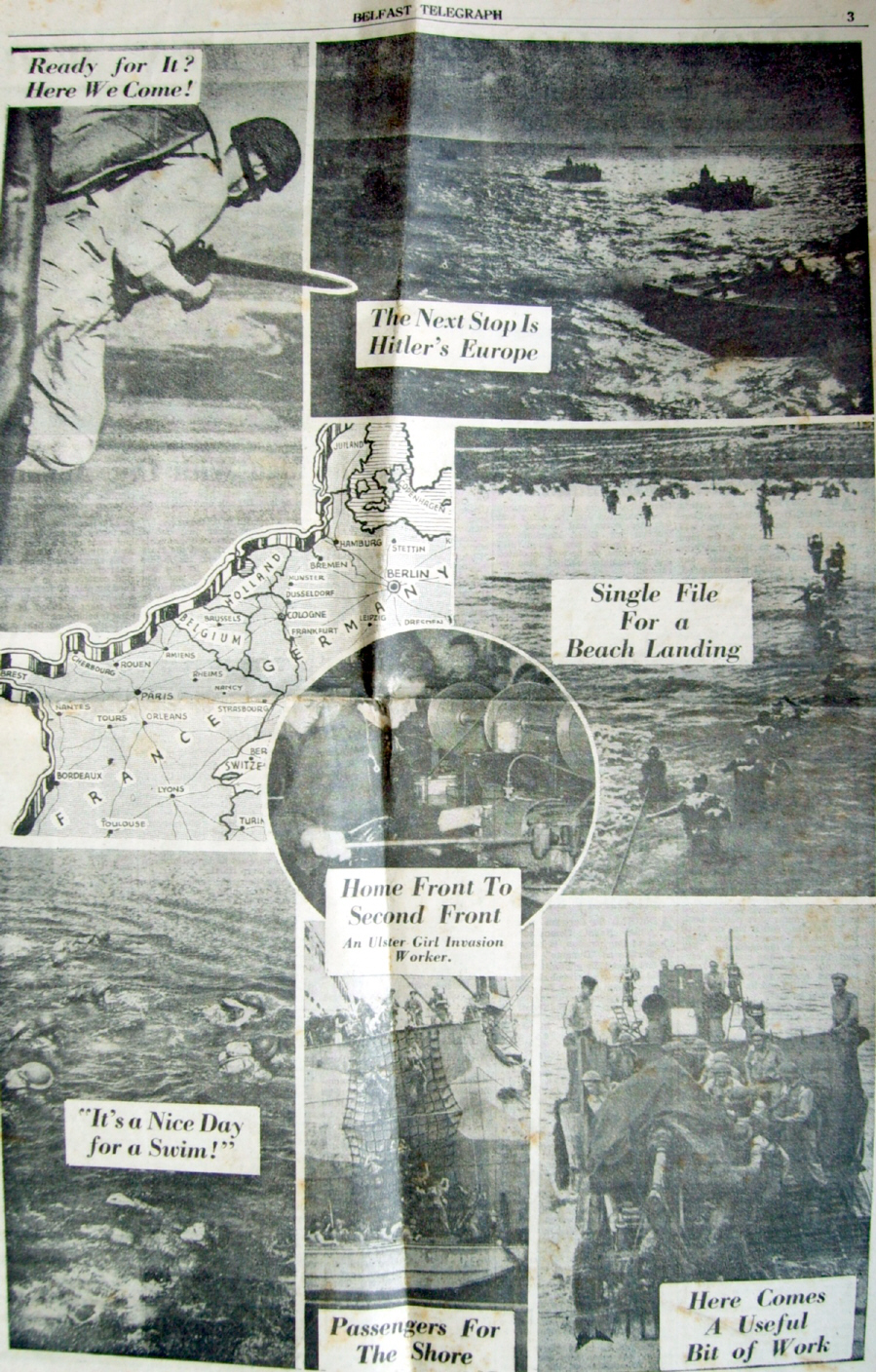
|
|
WHO'S WHO OF THE MEN WHO
ARE THE LEADERS OF THE INVASION
"Unless we make some grave mistakes in strategy, the year 1944 will
see the climax of the European War. Unless some happier event
occurs, on which we have no right to count, and the Hand of Providence is
directed by some crowning mercy, then 1944 will see the greatest sacrifice
of life by the British and American armies, and battles far larger and
more costly than Waterloo or Gettysburg will be
fought." - Mr.
Churchill in November, 1943 |
|
~~~~~~~~~~
GENERAL
"IRON-HAMMER" EISENHOWER IS JUST "IKE"
General Iron-Hammer! That is the literal translation of Eisenhower, the
name of the leader of the assault on Hitler's European fortress.
By a curious irony of fate, Eisenhower is of
German extraction. He is ruddy of face, bald, blue-eyed, and a
hundred per cent. soldier. He is a bitter fighter, with a vast
capacity for grand strategy and detail.
Until the Allied landings in North Africa he had
never commanded in a major battle, but now he is the world's No. 1 expert
in amphibious operations. After North Africa came Sicily, and then
Southern Italy - carried out with the true "Iron-hammer touch."
Born in Texas in 1890, he is the third of six
sons. He was graduated from West Point Military Academy in 1915, but
did not get overseas during the First World War. He taught tank
tactics and from then on was a serious student of mechanised
warfare. He was graduated with highest honours from the Army War
College in Washington, D.C., and from the Command General Staff School in
Fort Leavenworth, Kansas.
Although generally regarded as a tank expert, he
has always been a partisan of air power. At 46 he took up flying
personally and became a licensed pilot. As Chief of Staff to General
MacArthur in the 1930's he helped evolve the plans for centralised control
of military and air power. For the next few years he aided MacArthur
in the organisation of the Filipino Air Force and in working out the
defensive strategy employed seven years later against the Jap. onslaught
on Corregidor and Bataan.
During the Army manoeuvres in 1941 he helped to
direct operations of over 200,000 men and when the manoeuvres were over,
he was made a brigadier-general. Then came his appointment to the
War Plans Division in Washington; then he was made commanding officer of
U.S. Forces in the European Theatre of Operations; then Supreme Allied
Commander in North Africa.
Eisenhower is 52, married, and has an 82-year-old
mother back in Manhatten, Kansas. She calls him by his proper name,
Dwight, but to the U.S. troops he is known as just "Ike."
They idolise him.
~~~~~~~~~~
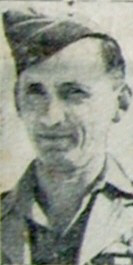
THE FIRST AIRMAN TO BE
CHOSEN AS SECOND-IN-COMMAND
Air Chief Marshal Sir Arthur Tedder, Deputy Supreme Commander of the
Forces that will liberate the Continent, is the man who prophesied in 1941
that "the close comradeship between our three services will, I am
convinced, be the vital factor in finally breaking the enemy's power in
the Middle East." He is also the man who in 1942-43 planned the
"Boston tea-parties," the pattern bombing of the Battle of
Egypt and the North African campaign, the man who thought of using
Hurricanes as "tin openers" to destroy enemy tanks, who has
demonstrated to the full the power of aerial co-operation.
The outbreak of this war found Tedder at the Air
Ministry as Director General of Research and Development. In
December, 1940, he left for an operational command. He took up his
appointment as Deputy C.-in-C. Middle East under Air Marshal Sir Arthur
Longmore as Wavell was striking at the Italian armies in Egypt and
forcing them back into Tripolitania.
He was always learning, planning, trying out
experiments. The first came in 1941; Tobruk was relieved and the Germans
were pushed back to El Agheila. But it was not until the offensive
phase under Alexander began in the autumn of 1942, that Tedder's plans
could be carried out. Then the Lease-Lend bombers began to reach him
in large quantities and he showed how they could be used.
When the campaign of Egypt, Cyrenaica, Libya and
Tripolitania was completed and the Army and the Air Force has crossed into
Tunisia Air Chief Marshal Sir Arthur Tedder was given still further scope,
for he was appointed Air Commander-in-Chief, Mediterranean.
Tedder laid his carpet, and the greatest tactical
air assault ever conceived began to blast a way for the big Allied push in
Tunisia.
Six days later all Axis resistance in North
Africa ceased, but the North West African Air Forces under Tedder were
already anticipating the next move; they were bombing North Africa and the
European mainland.
As the airfields in southern Italy were captured
the bombers of the air force under Tedder were able to join those based in
the United Kingdom in greater and greater numbers in the bombing of
Germany preparatory to a new offensive. For this offensive, General
Eisenhower was appointed Supreme Commander of the British and United
States Expeditionary Forces and for the first time in history an airman
was chosen as second-in-command in the person of Tedder. ~~~~~~~~~~
An adaptation of the famous 8th Army flash is used by General Montgomery's
Headquarters Staff as invasion insignia. It consists of crossed
swords in yellow with a blue cross on a red Crusader's shield. It is
worn solely by General Montgomery's staff and not by the invasion troops
as a whole. ~~~~~~~~~~ 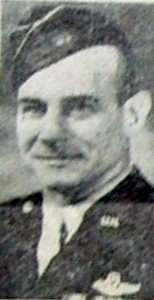
U.S.
AIR CHIEF IS HERO AND SCIENTIST
Major-General James H. Doolittle, Commander of the 8th U.S. Air
Force. When you meet him for the first time, he gives you the
impression of precise, intelligent politeness. He listens
attentively to questions; his answers are illustrative and exact. He
communicates confidence, experience, and a profound faith in the power of
air war. You feel that he is accustomed to the habit of command and
impatient with the slightest degree of inaction. What you don't get
is the impression that he is a hero and a scientist, for Jimmy Doolittle
does not believe that he is either.
Yet he is both. The career of the new
commander of the U.S. 8th Army Air Force in Britain is a dual record of
daredevil air exploits and extensive research which has speeded the
progress of aviation. Born in California in 1896, he joined the U.S.
Army Air Corps in 1917, when he was in his senior year at the University
of California. In a short time he was made an officer-instructor. In 1922
he flew across America in 22½ hours - an extraordinary feat in those
days. In 1924 he was awarded by the Massachusetts Institute of
Technology, the first degree in air engineering in the U.S. In 1925
he made international headlines when he flew an Army Curtiss Racer 232
miles an hour to win the Schneider Trophy.
The war has accelerated and
"spectacularised" his work. On April 18, 1942, the Tokio
radio broadcast that Japan had been bombed by American planes. It
was Doolittle who had led the squadron; his first enemy capital.
"The success of the raid exceeded our most
optimistic expectations," he reported. The following September
he was made Commander of the U.S. 12th Air Force in North Africa. He
dashed back and forth all over that area in a Flying Fortress inspecting
bases, airfields, repair stations, replacement crews. He never flew
anywhere without a couple of bombs in the Fortress' bay, "just in
case we see something to drop them on." His men hammered enemy
armoured columns day and night in Algeria, pounded Axis communications in
Tunisia, "strafed" Nazi installations at Oran; and at last, from
fresh, frontline bases, bombed military targets in Rome; his second enemy
capital.
No matter how much the Commander of the
"mighty Eighth" contributes to the wrecking of the Nazi
Fortress, the U.S. will have difficulty rewarding him. He has
already won the Congressional Medal of Honour, the Distinguished Flying
Cross with Oak Leaf Cluster, the Silver Star and the Air Medal, and
numerous decorations for pioneer work in speed experiments, blind flying,
aerial photography, the uses of high octane gasoline.
From Britain Doolittle's Fortresses and
Liberators will fly in bigger and bigger formations towards Germany.
It is not inconceivable that in one bomber, heading for his third enemy
capital, will be Major-General Doolittle. For throughout the
military world he is known as "the little man who is
everywhere." ~~~~~~~~~~ 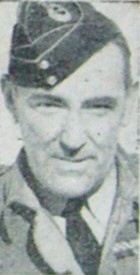
Air Marshal Sir Arthur Coningham, in command of the Tactical Air Force,
began his career in the Army. In 1916 he was invalided home from
Egypt and told that he was unfit for further service. But he was 21
and had his own ideas on the subject.
After six months at home in New Zealand he was as
strong as when he had left New Zealand University to join the Canterbury
Mounted Rifles in 1914. By September, 1939, Coningham had been
promoted Air Commodore and had become A.O.C. No. 4 Group. Then,
after two years, he left the bombers in North-East England for the
fighters and bombers of the Middle East, where Tedder was already in
command as A.O.C.-in-C. R.A.F. For some months Coningham was A.O.C.
of a bomber group stationed in the desert, and then with the start of the
winter offensive of 1941 he was appointed A.O.C. R.A.F., Western Desert.
Tall, dark, lean, seeing everyone and noticing
everything, he was confident and filled others with his confidence.
Speaking French, Italian and German, he can wise-crack in each as in
English. Tedder has been called "the architect of
victory." What he planned Coningham put into execution; the
aerial blasting that preceded the artillery barrage of Alamein in October,
1942, the bombing of Tobruk and Benghazi, and the many other ports and the
coast road to Tripoli.
Changes were made in the High Command in
February, 1943, so that though the Axis forces had retreated beyond the
borders of the Command originally held by General Alexander, Air Chief
Marshal Tedder and Coningham, yet they continued to fight against
them. Alexander became Deputy C.-in-C., Allied Force, North Africa,
and Tedder, A.O.C.-IN-C. Mediterranean, while Air Vice-Marshal Coningham
was given command of the air operations in support of the British 1st and
8th Armies and other troops on the Tunisian battlefield.
The Tactical Air Force, as it came to be called,
bombed the enemy from south and west during the months of March and April,
1943. Then on April 30, Air Marshal Coningham stood watching the
bombers under his command make the greatest air assault ever
conceived. It was a gigantic peppering of bombs with explosions
planted so tightly together that there were not many yards of surface
untouched. And after the "carpet" of a thousand yards by
four miles had been "laid" by the aircraft of the tactical Air
Force the ground forces advanced, still supported in the air by bombers
and fighters. ~~~~~~~~~~ 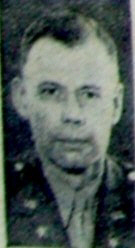
EISENHOWER'S
CHIEF OF STAFF
General Eisenhower's Chief of Staff is Brigadier General Walter Bedell
Smith, who is 46. General Smith entered the U.S. Army as a private
in the Indiana National Guard. He was commissioned a second
lieutenant in November, 1917, and was wounded in France later the same
year.
After the Great War he served at various infantry
posts in the United States, on the Mexican Border, and in the Philippines.
He became a member of the General Staff Corps in April, 1940.
On September 7, 1942, he joined General
Eisenhower in England and has been the latter's Chief of Staff since
serving with him throughout the African, Sicilian and Italian campaigns. ~~~~~~~~~~ 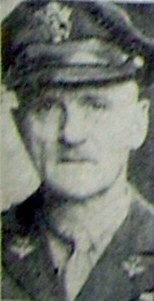
GENERAL
SHOT DOWN GERMAN PLANES IN LAST WAR
In 1899, when he was eight, red-headed Carl Spaatz was the youngest
linotype operator in Pennsylvania. He operated the machine in the
Boyerstown print shop where his Pennsylvania Dutch father and grand father
published the "Berks County Democrat." Carl had a happier
time in the evenings, when Father Spaatz taught him to play the guitar.
Father Spaatz, who later became a State Senator, got him an appointment at
West Point, so off he went in 1910, lugging his guitar.
The man who now commands the American Strategic
Force against Germany strummed his way through West Point without
scholarly distinction. He learned to fly in California. He
added an "a" to his name because people infuriated him by
pronouncing it "Spats" instead of the correct
"Spots." He shot down three German Fokkers at the front in
World War I. Wiry, wind-beaten, taciturn Carl Spaatz has been known
as a crack flyer ever since. He won a Distinguished Service Medal
then and another in 1920 when he and four other U.S. airmen took the plane
Question Mark aloft for a non-stop refuelling flight which established a
new endurance record.
He was serving as Chief of the Air Force Combat
Command in June, 1942, when he was suddenly "yanked out" and
sent to England to organise and train the 8th Army Air Force.
Germany is well aware of his success in this command. In December
that same frantic year when Allied armies were struggling across the muddy
mountainous country between Algeria and the coast of Tunisia and U.S.
airmen were groping through the complexities of coordinated operation,
Spaatz was brought to North Africa as air adviser to General
Eisenhower. The Germans are also well aware of his success in that
theatre.
General Spaatz has no violent theories which qualify
him for these strategic transfers. He just has an expert airman's
view of how air power should be used. He watched a German air raid
from a London rooftop one night and saw the Nazis drop incendiaries
helter-skelter on the city. "The damn fools," he roared,
"they're setting air power back 20 years."
He and Air Chief Marshal Tedder see eye to
eye. An air force, they both think, is an offensive entity, striking
at the enemy in co-operation with the army. Spaatz, blunt as a
hammer, likes and is liked by the British.
When the Queen paid a visit to the U.S. Air
Forces and rain began to fall the general quickly wrapped his coat around
her shoulders, "Your Majesty," he said, "this makes you a
major-general in the American Air Force." ~~~~~~~~~~ "I
never put an army into battle until I am quite certain it is going to be a
good show - never, We won't have any question of failure. This
was began a long while ago, I am getting fed up with the thing. I
think is it nearly time we finished. General
Montgomery in February last ~~~~~~~~~~ |
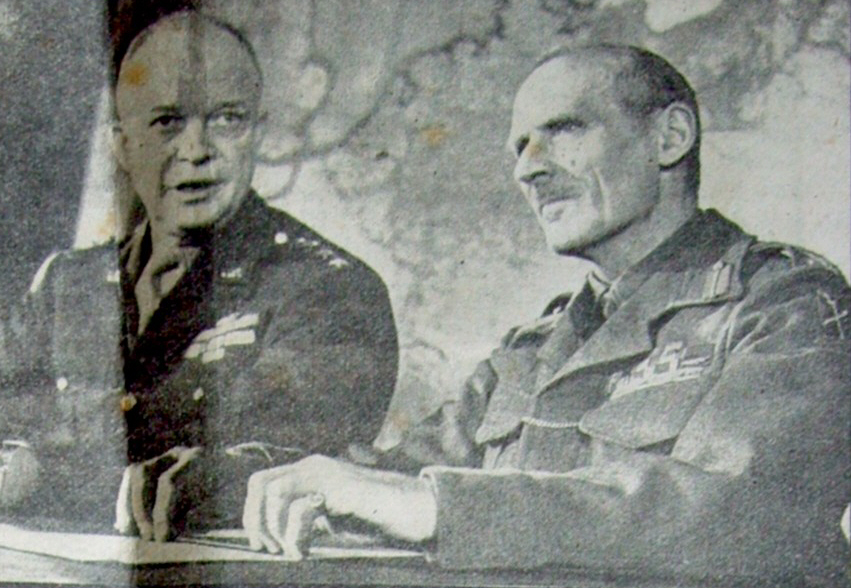
Generals Eisenhower and Montgomery talk
things over
"MONTY,"
THE MAN WITH ONE AMBITION
General Sir Bernard Montgomery, is of course, the Ulster lion. He is
a shirt, spare man, hard and bold in battle, the man who made Rommel run at
El Alamein, the man who turned the whole course of the war and wrote
"Ulster" across the war maps in letters of fire.
He is 56, a widower, and has one son. His father
was a distinguished Ulster prelate, Rt. Rev. Sir Henry Montgomery, former
Bishop of Tasmania, who died at his Moville home in 1932. His
maternal grand-father was Dean Farrar, author of "Eric, or Little by
Little."
"Monty" is the most Spartan of Spartans;
he lives simply and abhors luxury; he fights hard and gives no
quarter. He expects none.
The Germans call his ruthless - and he is.
His sole ambition in life is to do the very best job he can; he expects his
men to do the same.
As a young officer just out of Sandhurst he is
remembered for his interest in his work and the more strenuous athletics,
and his dislike of social activities. In the last was he won the
D.S.O. and the French Military Cross and was mentioned half a dozen times
in despatches.
In this war he sprang into prominence when he
hurled the Germans back from the El Alamein line. The Tacticians say
he accomplished the most difficult task that could confront any general -
frontal attack against strong defences in depth. For a time there was
the cunning lure of an Axis pocket between Tel-el-eisa and
Sidi-abd-el-Rahman. This might have foxed a lesser general into
diverting his forces, but not Montgomery. He had made up his mind to
cut the Axis armies to ribbons. He did.
His superb confidence is Monty's great
characteristic. Once after a staff conference in which he outlined
his plan for forthcoming action, a brigadier-general said "I
understand what is ahead of you, but what is behind me?"
"You've got me behind you," replied
"Monty" tapping his finger on his chest.
~~~~~~~~~~
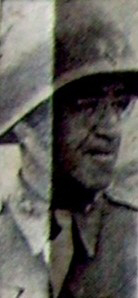
COMMANDER OF U.S. ARMY'S
SECOND FRONT GROUND FORCES
"I've spent 25 years trying to explain why I wasn't overseas in the
last war. Thank goodness I'll be spared that this time." said
Omar Nelson Bradley when he put foot on North African soil in February,
1943.
Until that moment no U.S. officer had disembarked
in a theatre of war with so firm a conviction of the foot soldier's
obligations in battle. "No matter how excellent our equipment or
how effective our artillery," he said, "it is the infantry
which must bear the brunt of the battle." His application of
this certainly has produced victories from Gafsa, in Tunisia, to the
Straits of Messina.
It has won his (him) two French decorations, a
Distinguished Service Medal, and a Lieutenant-Generalship. It is
responsible for General Eisenhower's appointment of him as Senior
Commander, American Ground Forces, Allied Expeditionary Force, the coming
invasion of Europe.
Omar Bradley was 51 on Abraham Lincoln's birthday,
February 12. He was born in Moberly, Missouri, commissioned from West
Point in 1915, served conventionally through '41 when he was places in
charge of an officer's candidate school.
He is what soldiers call a "quiet
operator." He is tall, soft spoken, decisive,
imperturbable. A war correspondent has said of him: "It would be
toying with the truth to call him handsome." He is a terrific
walker. During a campaign he averages only about five hours a day in
his jeep. "It's good for my liver," he says.
He is totally without swagger, as any of his men
will tell you. One young officer remarked, as he left the General's
presence, "He makes me feel like the general."
Some infantry commanders believe in the theory of
direct attack, accepting a 30 per cent. loss of men in order to achieve an
objective quickly. Bradley more sensitive than most to casualties, is
as thrifty with his men as war allows. If the enemy doesn't crack
after a direct attack, he devises another method of attack.
"We can't get out without some loss of
life," he says, "but it's really harder on some of the
newer officers than it is on me. After all, I've spent 30 years
preparing a frame of mind for accepting such a thing."
When General Bradley received his third star his
19-year-old daughter wrote him a letter of congratulation.
"Mother and I," she wrote, "think you are the
greatest general in the world - next to General Marshal." ~~~~~~~~~~ 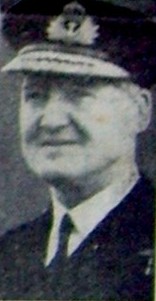
BACHELOR
EXPERT ON BIG GUNS
Admiral Sir Bruce Frazer, Commanding the home fleet Forces of Liberation,
is 56 and one of the Navy's greatest experts on air-sea strategy. He
knows more about big naval guns than probably any other man in England, and
was responsible for the 14-inch guns with which the great new battleships
of the King George V class were armed.
Sir Bruce has devoted his life to the Navy, and
his interests outside it are few. As a young gunnery officer he was
soon singled out for promotion, and his gifts as a commander eventually
brought him one of the biggest commands in the British Navy, that of the
aircraft carrier Glorious. He was director of Naval Ordnance at the
Admiralty from 1933 to 1938, and in March, 1943, following a brilliant
interlude as captain of the Glorious, became Chief of the Home Fleet in
succession to Admiral Sir John Tovey.
His task in this command was to pin down the
German High Seas Fleet and watch the North Sea, the Atlantic, and the
Arctic all at the same time. In this post he was responsible for many
brilliantly executed operations, including the sinking of the
Scharnhorst. Admiral Fraser is unmarried. ~~~~~~~~~~ 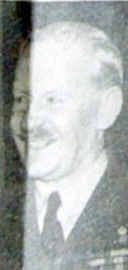
HIS
MOTTO IS "THE BIGGER THE BOMBS THE BETTER"
Air Marshal Sir Arthur Harris, commanding the R.A.F. Bomber Commands, is
perhaps best described as "Hamburg Harris." He is the man
who launched the thousand bomber raids on Germany and who decimated
Hamburg, Lubeck, Cologne and other cities of the Reich in the early days of
the air offensive.
His biggest concentration of bombs was on
Hamburg. Until then never had an attack of such weight and
persistence been made on a single industrial target.
In private life Harris is a man of quiet
tastes. He likes to read history and books on farming, but he has
left his books aside for the moment to give all his attention to bombs -
"the bigger the better." Next to Churchill, Harris is
probably the Germans' biggest "bogey-man." His attacks on
Hamburg and other leading targets were followed by tirades of hysterical
abuse on the German wireless in denunciation of "the murderer
Harris."
Nothing however, ruffles Harris. Nothing
turns him aside from his purpose - to bring about the end of this war in
the shortest possible time. He once said that the day would come when
it would be possible to send 1,000 bombers over Germany every day, and
"from that day I give the war four or five months."
Harris was Deputy Chief of Air Staff before his
promotion to Bomber Command. ~~~~~~~~~~ 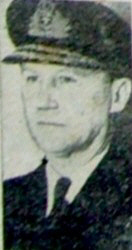
THEY
CALL HIM "DYNAMO" RAMSAY AT 60
Admiral Sir Bertram Ramsay, Allied Naval Commander-in- Chief of the
invasion, is known in the Service as "Dynamo" Ramsay. He
has served his apprenticeship in grand strategy as one of the senior
officers under General Eisenhower in the combined operations in the
Mediterranean. His handling of the landing operations in North Africa
was regarded as "masterly," and the knowledge and experience
which he acquired then should prove invaluable in the larger operation
which has now begun.
In recognition of his part in the capture of
Sicily he was awarded the K.B.E. in December last. He also achieved
fame for his work at Dunkirk - he planned this historic evacuation.
Admiral Ramsay was actually on the retired list
when the war began in September 1939. He had retired in 1939 after 40
years distinguished service, and was living quietly at his home at
Coldstream, Berwickshire, when he was recalled. As a former
Chief-of-Staff of the Home Fleet he was regarded as one of the most
knowledgeable men in Britain in regard to the war at sea, and his vast
experience was soon put to good use,
Although he is 60 his dynamic energy has made him
one of the most redoubtable of the invasion leaders. ~~~~~~~~~~ 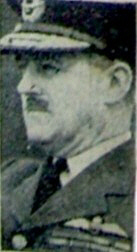
ALLIED
AIR C.-in-C. IS A RECTOR'S SON
Air Vice Marshal Leigh-Mallory, the Allied Air Commander-in-Chief, was 22
when he was commissioned as a 2nd Lieutenant in the 4th Battalion of the
Lancashire Fusiliers in August, 1914, for he was born on July 11, 1892, at
Mobberley, Cheshire, where his father and grandfather had both been
rectors. But in July, 1916, he left the Army on being seconded as a
flying officer to the Royal Flying Corps, with which he was to serve with
distinction in France. Three years later, on choosing the R.A.F. as a
career rather than the Bar, he was granted a permanent commission as
squadron leader.
In the next few years he served in many different
positions with brilliance. It was as A.O.C. No. 12 Fighter Group that
"L-M," as he is known in the R.A.F., went into battle against the
Luftwaffe in 1939. He directed the work of Wing Commander Bader's
wing in the Battle of Britain, a wing which destroyed some 150 German
aircraft in seven engagements. On many other occasions in 1940 he sat
in the Control Room of his Fighter Station and directed as many as three
wings of fighters at a time. For these "distinguished services
rendered in recent operations" he was awarded the C.B. in July,
1940. Later in the same year he transferred to No. 11 Group, again as
A.O.C.
In addition to commanding a fighter group,
Leigh-Mallory was also helping to form the Polish Air Force in the United Kingdom,
and in recognition of his work in its organisation and development he was
awarded the Polonia Restituto medal in June, 1942.
Two months later he was commanding units of the
Polish Air Force, for they took part with other units of the Allied Air
Forces, the U.S. Air Force and squadrons from Bomber, Fighter, and Army
Co-operation Commands of the R.A.F. in the Dieppe Raid. The aircraft
took off long before dawn and the air battle that began so early went on
till dusk. Pilots flew to clear the air above Dieppe and the
Channel. German aircraft were prevented from hindering the landing
operations, the work undertaken ashore and the re-embarkation by directions
sent from the headquarters of a Fighter Group under Leigh-Mallory.
Besides the bombers attacking gun-posts and
strong-points, the smoke-laying of the Blenheims and Bostons, Hurricanes,
and Spitfires fought countless battles so that by the end of the day 91
enemy aircraft had been destroyed and another 100 probably destroyed or
damaged for the loss of 98 of our aircraft of all types with 30
fighter-pilots saved. ~~~~~~~~~~ 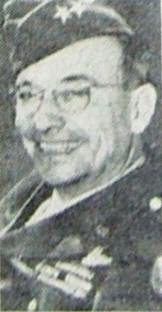
HE
IS PROUD OF THE IRISH IN HIM
Major-General Lewis H. Brereton, Commander of the 9th U.S.A.A.F., U.K.
Forces of Liberation, is affectionately known in the Service as
"General Looie."
He is a typical American, renowned for his
forcible method of speech, particularly when over enemy targets.
Originally he was trained for the Navy, graduating from Annapolis,
America's Dartmouth, in 1911. At that time, however, the U.S. Army
was urgently in need of second lieutenants, so young Brereton resigned from
the Navy and joined the Artillery. A year later he transferred to the
infant Air Arm of the Army and served with it in France from 1917, winning
the Distinguished Service Cross and the Purple Heart.
With the entry of the U.S. into the present war
"General Looie" stepped into world prominence by making the first
U.S. bombing flight to be led by a general. This was a flight of
Flying Fortresses over the Japanese held Andaman Islands. It was he
who formed the U.S. Air Force in India to operated from Chinese bases
against Japan. Social life in Delhi did not appeal to this
unconventional general, and one of his first orders to his staff was a
warning against: "Delhi-dallying."
Incidentally, "General Looie" is
particularly proud of the "Irish in him" - he is of English and
Irish descent. He is 53. ~~~~~~~~~~ 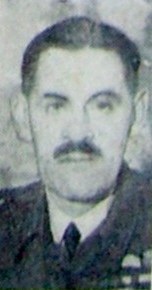
ONE-TIME
PRIVATE WHO HAS CHARGE OF OUR AIR DEFENCES
The man in charge of Britain's day and night air defences is Air-Marshal
Sir Roderic Hill, one of the intellectuals of the invasion team, but an
intellectual with a strong practical strain. He is the son of a
professor and has a string of degrees after his name in addition to
decorations for military achievement. In addition he is a Fellow of
the University College, London.
Like so many other airmen who have climbed to fame
Sir Roderic began in the Army. In 1914 he joined up as a private on
the 18th Royal Fusiliers, and was commissioned a month later. He was
wounded and mentioned in despatches, but land-fighting proved "too
tame" for him, and he transferred into the Royal Flying Corps in 1916
where he got his M.C., and was again mentioned in despatches. From
1917 to 1923 he was in charge of the Experimental Flying Department of the
Royal Aircraft Establishment, and was one of the pioneers of modern flying,
holding up to the outbreak of the present war a variety of posts in the
Service, that of Air Officer Commanding in Palestine and Transjordan.
Sir Roderic has played an important part in this
war in planning both the offensive and defensive tactics of the
R.A.F. As defender of the British skies he is the right man in the
right place. |
|
THIS IS THE GERMAN
"WEST WALL"
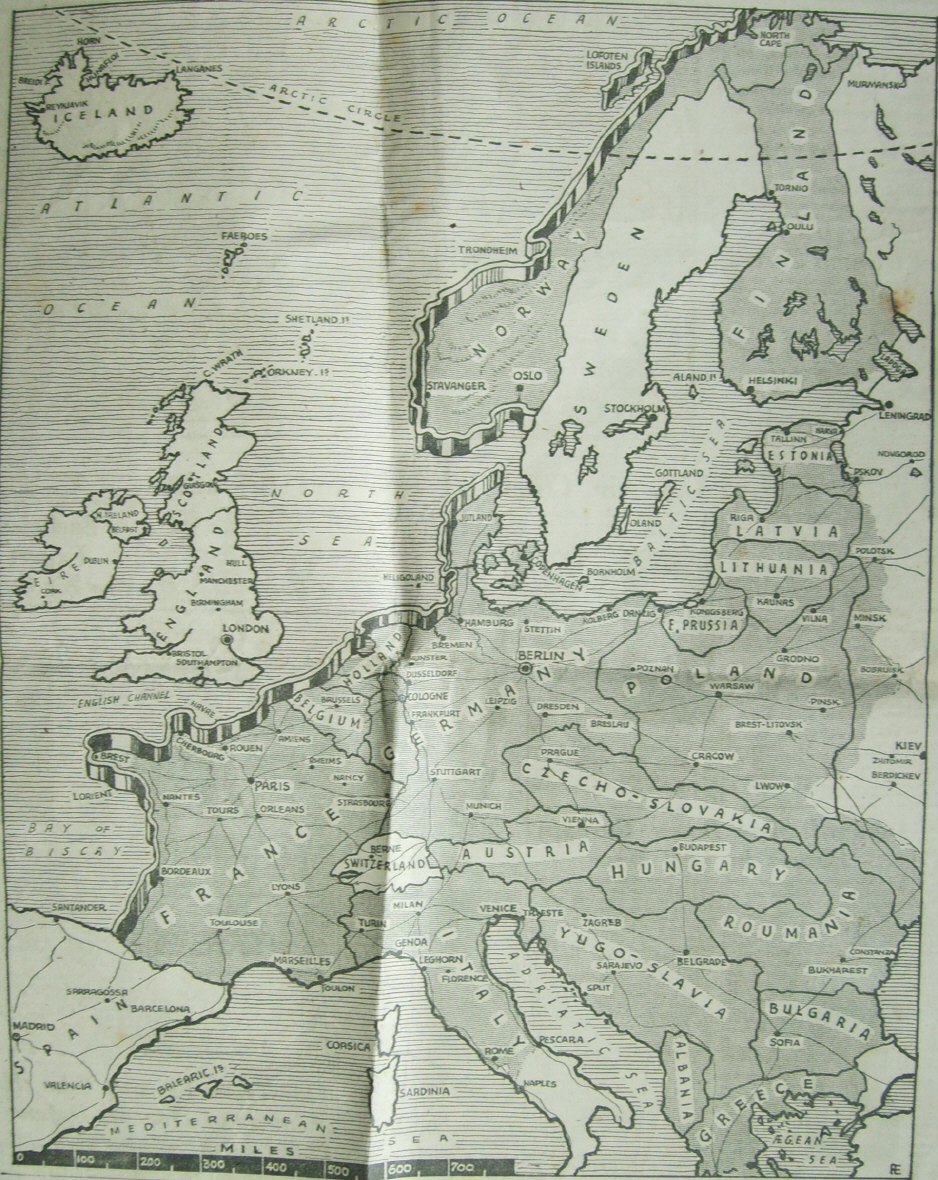
|
|
BRITAIN ONCE BEFORE
INVADED FRANCE ACROSS THE CHANNEL
England invaded France across the Channel in 1346, and seized a beachhead
at Calais that endured for 200 years.
In the Hundred Years War, Edward III, aspiring to
the French Throne, loaded up an invasion force at Portsmouth and set off
for the coast of Normandy.
To-day a successful amphibious operation requires
control of the air. In those days of military innocence control of
the sea was enough, and Edward secured that by smashing the French Fleet
in 1340.
And Edward too, had a secret weapon as he and his
army swarmed up the beaches at Barfleur. He had no reason to use it
then, however, for the French offered little resistance as he marched on
to Rouen and thence down towards Paris.
Stopping before Paris he decided his lines were
too thinly stretched, turned boldly, and marched north towards
Calais. At Crecy he found the French Army at last blocking his path,
and released his secret weapon. It was a massed force of trained
archers, who shot into the charging French cavalry with fearful
execution. The back of the French Army was broken there, and Edward
swept on to Calais.
The tide of English conquest rolled high in that
protracted war, and once lapped over the northern half of France.
But at last the French found a secret weapon of their own - artillery
firing round shot that slaughtered the British bowmen.
|
The invader was routed from most of France, and the
Hundred Years' War ended in 1453. But that firm beachhead at Calais
lasted for another hundred years.
~~~oOo~~~
Invasion is a different matter now. These are the days of the
"super battle" a phrase first coined by Nazi military
commentators in describing events on the Soviet front. That
expression has come home to us with the launching of the Western invasion.
So far the gigantic combat of the East has been
difficult for us to visualise in its terms of thousands of miles and
hundreds of thousands of men.
Our campaign in France will probably be very like
that being carried out in the Soviet river country - and its cost will be
as heavy.
Until recently our fighting could be termed as
"war of movement," in which the manoeuvring skill of a general in
command often decided the particular issue. Now it has become a
matching of brute strength; a snow-plough push against deep drifts rather
than a quick rapier like plunge.
In the West and for invasion our irresistible
force is meeting the "immovable" body of Nazi defence and both
sides will pay heavily in human lives before the defence gives way against
the giant battering-ram of our troops.
|
|
LIBERATED ROME SYMBOL
FOR STRICKEN ITALY
By C. M. Franzero
(Former London Correspondent of "Giornale d'Italia")
Many people in Italy will be found prepared to argue that Rome never was
in modern times a Capital in the sense that London is the Capital of
Britain.
It is true enough that Roma never meant that
centralisation of politics, finance and trade, which made London the
commercial as well as cultural centre of Britain and of the British
Empire.
Yet all Italians, cynic and realistic as they
are, would tell you that Rome means for Italy the very heart of the
nation. For centuries, even before the ideal of a United Italy was
nurtured by Italian thinkers and patriots, Rome was looked upon as the
Mother City, and the patriots of the Risorgimento, whatever their
particular political conceptions - from the Republican followers of
Mazzini and Garibaldi to the Monarchist collaborators of Count Cavour -
all kept their eyes fixed on Rome. Without Rome, Italy could never
have been considered complete and united.
MORTAL BLOW AT FASCISM
Its liberation from the Germans - and indeed from the last traces of the
tyranny of Mussolini - will have a terrific repercussion in those parts of
Italy which are still under the Nazi heel. It will deal a mortal
blow, too, to the fanciful Fascist Republic set up by Mussolini in his
hiding-place.
The Germans have kept Mussolini a virtual
prisoner. In his villa at Fasano on Lake Garda he is watched over by
a "jailer" of high rank, Ambassador von Rahn, who occupies
another villa close by.
From his office he directs the affairs of
"Republican Fascism" in Northern Italy, by permission of his
German masters, who take leave to smother or annul any of his edicts which
fail to suit their purposes.
The drift of his policy is markedly more
Republican than Fascist. The "revolutionary" social
reforms he tried to set up earlier this year have proved a dead letter,
and there is no one who does not know in his heart that Mussolini's new
Government has no future, and will disappear with Germany's defeat.
It never had any real authority or the means of enforcing it.
Notwithstanding ruthless pressure and propaganda,
such as the claim that "thousands of Partisans have
surrendered," Mussolini has never even succeeded in putting together
the shadow of an army. The few thousand men who have been mustered
are armed with a variety of weapons and dressed in fanciful semi-civilian
garb, because there are no new uniforms and no cloth to make them.
BOYS WITH ROWS OF RIBBONS
The breasts of quite young boys who have never seen a day's fighting are
adorned with rows of ribbons, for it has become fashionable to display the
medals of relatives.
Even these boys, many of whom are barely 16, are
fully armed with machine-guns and revolvers, and carry hand grenades
strung to their belts. Indiscipline is the order of the day,
combined with much impudence and ribaldry. Even more grotesque was
the attempt to reconstitute a Navy.
Mussolini's Republican Navy exists only on paper,
because the small proportion of the Italian Fleet that did not reach
Allied ports after the Armistice was confiscated by the Germans, and
Commander Grossi's submarine squadron is immobilised in a French port,
since the Germans do not care to entrust Italian submarine crews with war
missions any more than they trust Mussolini's new "Army."
The only active element of the Army, and perhaps
the most conspicuous, have been the so-called "Compagnie della Morte,"
or death squads, who are reputed to be "ready for anything."
Such is the picture of Mussolini's Fascist
Republic," and it would not be surprising if, now that Rome is freed,
we find ourselves on the eve of very serious developments in the provinces
still under the Nazi-Fascist sway.
With the fall of Rome, Mussolini has met his
"Waterloo." There is a possibility that Marshal Badoglio
with the new Government will take new measures towards interpreting the
real feelings of the Italian people.
No voices will be fully representative of the
whole nation till the population of the all important North is free.
But the freeing of Rome remains an event of the highest augury, one which
rejoices the very soul of Italy.
ALLIED CONTROL OF ROME
SPECIALISTS TEAM
From SHOLTO WATT
("Daily Telegraph"
Correspondent with the 5th Army in Rome)
The 5th Army brings an army within an army for the administration and
safeguarding of Rome, ready to feed and protect its citizens. Rome
will hold only the minimum of troops necessary for these purposes - it is
our declared policy that Rome is not to be a garrison city and that the
5th Army is not here to stage triumphal marches.
The Vatican City, as a neutral State, will be
treated with the utmost consideration. Its population will be fed if
necessary, and earnest efforts will be made to meet any requests made on
behalf of the Pope.
Dealings with the Vatican will be through the
British and U.S. Ministers, Sir D'Arcy Osborne and Mr. Harold Tittman.
Rome area command will be under Major-General
Harry H. Johnson, of Eagle Lake, Texas, and the "Mayor" of Rome
will be Senior Civil Affairs Officer of the 5th Army, Brigadier-General
Edgar Erskine Hume, of Frankfort, Kentucky. Their task will be to
relieve the fighting forces of the 5th Army of the responsibility for
Rome.
FEEDING 2,000,000
It
is not known at present how many people there are in Rome, but General
Hume is prepared to feed up to 2,000,000. Transport communications
and Utilities Division of the Allied Control is prepared to meet almost
all conditions.
There is even apparatus to distil water from the
Tiber if other sources prove insufficient. Lighting materials for
the whole city are on the way, as well as supplies of petrol for essential
traffic.
A team of specialists under General Hume, trained
for many different jobs, include -
Legal officers, who will set up courts at the
earliest moment, their concerns being only civilian offences against the
Allied Forces.
Welfare officers who, beside supplying food, will
give other relief in urgent cases both to Italians and Allied nationals in
Rome.
Public health officers to prevent epidemics.
Labour officers to recruit civilian workers for
military purposes.
Education officers to reopen schools, scrutinise
teachers and purge text books of Fascist ideology.
SECURITY TASK
Maintenance of security is among the prime tasks. So complete is the
Allied organisation that our own fire-fighters are being brought in.
The normal administration of Rome in ten
districts will be retained. each district will be under a civil
affairs officer and a political officer, who, with the Carabinieri, will
form a miniature Government.
Some of General Hume's officers will control
Allied property appropriated or sequestrated by the Italians, which we are
now taking back.
The black market will be controlled as far as
possible.
BUTCHERY BY BULGARS
CAPITAL A SHAMBLES
From A. T. CHOLERTON
("Daily Telegraph"
Correspondent in Istanbul)
The new Bulgarian Premier Bagrianoff's first act was, despite Moscow
warnings, to intensify the drive against the guerillas and other pro-Russian
elements. Some 30 of the newly-formed Terror-Gendarme battalions
have already ringed in and are now purging selected areas with shootings
and atrocities against families.
Surgeon Professor Stanicheff - one of the old
Mikailoff Macedonian gangs - Minister of the Interior, directs this
operation, combining his duties with the portfolio of Public Hygiene.
The advent of this sorry, new stooge Government
means that Hitler has so far had his way, without having to take over the
direct administration and even without moving in a single extra battalion.
RUSSIAN WITHDRAWAL
The realist Russians have withdrawn their Minister and Counsellor from
Sofia, evacuated women and children, but left 25 officials, including the
Military Attaché. Service attaches are usually pulled out ahead of
time when trouble is coming.
Their Legation is the sole one still working
right inside the ruined little city. Guarded as it is, it is not
much use, but they have been reluctant to break until a breach should
serve a major purpose.
Every Bulgar, even those who got their people
into this mess, hates the Germans for it. Russia alone is popular
there. Czar Alexander II liberated the Bulgars from the Turkish
yoke, and Stalin has not yet dropped one bomb on the Varna and Burgas
naval bases, the sole points where there are any considerable number of
German troops. Burgas too, has the finest airfield in the Balkans
and dominates the Straits.
Fifty of the surviving 140 members of the
Sobranje (Parliament) are said to be pro-Russian, the mass of peasants
also, together with most of the young intelligentsia and many of the
reserve officers. The workers are mainly pro-Communist. But a
Russian landing on the Bulgarian coast seems at present unfeasible, and
the Red Army is still over 200 miles away.
A Russian declaration of war, unless combined
with very large-scale operations from our side, is not likely to loosen
the Nazi grip on Bulgaria now. It would precipitate disintegration
and so embarrass Hitler, but it might lead to a damp squib rising.
PARTISANS ILL-LED
The Bulgarian Partisans are ill-equipped and do not seem to number more
than 10,000. Ill-led, having no Tito, they work in small bands,
raiding for food and taking minor reprisals rather than going for major
communications.
It is believed that the Nazis had to disarm two
shaky Bulgar divisions, and they do not let the Bulgarian pilots take the
air. Although the army cadres are certainly being purged to some
extent, no evidence has so far reached Istanbul of any widespread Army
plot. The Gestapo's hold on the police is fairly absolute.
When we destroyed Sofia we dispersed the
political opposition and also drove the Government departments out into
the primitive townships. Instead of going again for Sofia the R.A.F.
might try these and also the provincial garrisons. Like most fearless
primitives the Bulgars do not take bombing well.
16 JAPANESE SHIPS SUNK
BY U.S. SUBMARINES
Washington, Monday - Sixteen more Japanese ships have been sunk by U.S.
submarines in the Pacific, the Navy Department announces. Six were
transports and the rest cargo vessels - Reuter.
R.A.F. APPOINTMENTS
Air Commodore Stephen Charles Strafford has been appointed Chief of
Operations and Plans Headquarters, Allied Expeditionary Air Force, and to
be Air Vice-Marshal, it was announced last night.
Air Commodore Oliver Eric Carter is to be
Director-General of Aircraft Supply, Government of India, and to be Air
Vice-Marshal. |
NAZI VALUES ON THEIR
LIVES
THE FIVE LEADERS
The
five leading Nazis - Goering, Goebbels, Ribbentrop, Himmler and Ley - value
their lives at a total of 30,000,000 dollars.
An average of £1,500,000 each, says the Soviet
writer Ilya Ehrenburg. He wrote in "Pravda":
At a funeral of air raid victims at Essen,
Goebbels demanded: "How can a German life be valued?"
His own life, however, Goebbels had valued
precisely. He insured it for £2,490,000 dollars. Comrade
Himmler is more modest. He valued his person at 635,000
dollars. The life of the notorious thief, Ley, is insured for 841,000
dollars. Goering prizes himself considerably higher and has grown
sufficiently rich to insure himself for 4,000,000 dollars.
"Ribbentrop
has surpassed them all. This enterprising gentleman has insured his
life for 5,665,000 dollars.
"These five cannibals also hold deposits in
foreign banks to the value of 16,415,000 dollars."
POLISH PREMIER'S
DISCUSSIONS
VISITING AMERICA
M.
Mikolajcyk, the Polish Prime Minister, is to discuss with President
Roosevelt general European and Polish questions.
An announcement issued from the State Department
by Mr. Edward Stettinius, Under-Secretary of State, yesterday said that on
the invitation of the U.S. Government the Polish Prime Minister is on a
courtesy visit, his first trip to this country since his assumption of the
Premiership. - Reuter.
Mr. Edward Stettinius, U.S. Assistant Secretary of
State, said yesterday that the State Department had no new proposal or
formula for the settlement of the Soviet-Polish dispute to offer to M.
Mikolajcyk (Mikolajczyk). The Soviet and British Governments had been
advised of the visit.
KESSELRING'S PLIGHT
NO AIR PROTECTION FOR BEATEN ARMIES
By Air Commodore HOWARD WILLIAMS
("Daily Telegraph" Air Correspondent)
Kesselring's armies, floundering outside Rome, have to all intents and
purposes no air protection whatever.
A fantastic situation has thus been created, the
Allied air pressure on the retreating armies has been described to me as
terrific.
On Sunday our strategic bombers heavily attacked
the railways in North-West Italy and along the coast of Southern France -
railways by which reinforcements might have been sent. Scarcely an
enemy fighter appeared.
Although some 300 German fighters are stationed in
Austria to protect Germany's southern air flank, it seems that not one has
been moved in to help save the army in Italy.
There was some speculation yesterday as to whether
the plight of the Wehrmacht in Italy was an indication of the fate of what
awaits the German armies elsewhere when other fronts are opened.
The reason for the present debacle in the air is
that the Luftwaffe is so short of reserves that the German High Command
dare not risk what they have to try and save their divisions.
An interesting point that arises is the use to
which the Rome airfields can be put by the Allies.
They are all likely to be impressed into speedy
use by the Tactical Air Force in its assault on the enemy armies.
With the strategic bombers already firmly based
around the Foggia airports there seems no point in moving them to the Rome
area. Such a step would save only a few miles.
KEEPING NAZIS ON THE
RUN
IS THE ALLIED PLAN
By Lieut.-General H. G. MARTIN
("Daily Telegraph" Military
Correspondent)
After
23 days of continuous battle Kesselring's armies are in full retreat.
That they should have left Rome behind them practically intact is
significant. It was well be that the Army had insisted on moderation
where the party would have utterly destroyed.
The count of prisoners up to yesterday was over
20,000. The mopping-up of stragglers, which will continue for days,
cannot fail to bring in many more.
The German divisions in Italy started the battle
with a strength of 10,000 - 12,000 apiece. Deducting subsequent
losses in killed and wounded, we can safely put the average strength of a
division to-day at not more that 7,000 - 8,000.
When the final county is made, therefore, we are
likely to find that Kesselring has lost the equivalent in prisoners alone
of at least four divisions south of Rome.
EXHAUSTED REMNANTS
We
know that the remnants of his armies are exhausted, disorganised, and short
of a large proportion of their transport which our Air Forces have
destroyed.
The problem then which faces Kesselring is this -
to form a new front somewhere north of Rome through which he may withdraw
this inchoate mass to some area of comparative safety still farther north,
where he may restore order out of chaos.
The lie of the roads and the mountains suggest
that he may hope to find this new front somewhere on a line south of (that
is covering) the lateral road from Guilianuova on the Adriatic through
Teramo. Aquila and Rieti to Civitavecchia on the Tyrrhenean Sea.
Such a front would cover both the port of
Civitavecchia and the airfields of Viterbo.
On the Adriatic Kesselring can hardly avoid some
readjustment to conform with his withdrawal elsewhere.
THE ALLIED PROBLEM
Conversely, the Allied problem is simply this - to keep Kesselring's armies
on the run till they are run off their legs, to blast his columns on the
mountain roads, to give him no respite to reform to destroy him
utterly. The hunt is up - General Alexander is a matchless huntsman.
It is impossible to believe he will allow
Kesselring to spirit away some 20 divisions, and we may expect soon to see
new Allied thrusts - the outcome of some rapid regrouping.
Thus the German High Command is likely soon to
find itself faced with this dilemma - peculiarly awkward at this juncture -
either to reinforce Italy further from any High Command pool there may be,
or to write off Kesselring and his armies, laying open the Po Valley to
Allied invasion.
TREATY DENOUNCED
Marshal Badogilo's Cabinet has formally denounced the Armistice Treaty
imposed on France by Mussolini in 1940, it was announced in Naples on
Monday night states British United Press.
THREE ULSTER AIRMEN
DECORATED
A
long list of the R.A.F. honours issued to-day includes the following :-
Bar to D.F.C. -
Flying Officer Robert McCurdy, D.F.C., R.A.F., who, the citation states,
"has filled the post of squadron gunnery leader since July, 1943, and
has succeeded during this period in greatly improving the standard of
efficiency among the air gunners of his squadron.
"Since the award of the Distinguished Flying
Cross he has taken part in a number of operational sorties, which have
included four attacks on Berlin.
"Throughout a long and arduous career Flying
Officer McCurdy has shown great determination, cool courage and efficiency
of a high order."
Flying-Officer McCurdy is a son of Mr. and Mrs. E.
McCurdy, 13 Blakeley Street, Belfast. he won his D.F.C. in August,
1943. He joined the R.A.F. in 1936 when 18 years old. In 1941
he was posted to the Middle East as rear-gunner in a Wellington
squadron. From various bases in North Africa he took part in raids on
Greece, Crete, Syria and the Western Desert. He returned to England
and after a year as instructor of air-gunners he rejoined a bomber
squadron, taking part in raids over Berlin, Essen, Duisberg, Spezie,
Cologne and Milan. Later he was transferred to a Rhodesian
squadron. His brother, Albert, is a sergeant-gunner in the R.A.F.
D.F.C.
- Flying Officer Robert Frazer, R.A.F., whose home is at Belfast, where he
was born in 1922. He was educated at Woodvale, Belfast, and
Whiteabbey Technical School. He enlisted for air crew in 1939 and was
commissioned in 1943.
D.F.M. - Sergeant
Gerard McFadden, R.A.F., who was born in 1914, at Derry. His home is
at Southgate, London. He enlisted in 1938 and is now air gunner.
U.S. CARRIER SUNK
The
U.S. escort carrier Block Island was sunk in the Atlantic last month, as
the result of enemy action, the Navy Department announced in Washington
last night, states British United Press. Casualties were light.
PROGRESS BY THE CHINESE
ALLIES ADVANCE
Chinese forces have captured Tumbongkha, ten miles south-east of Kamaing,
and 12 miles north-east of Mogaung, which is the former rear echelon
headquarters of the once potent Jap. 18th Divisions, says Frank Hewlett,
British United Press War correspondent, cabling from North Burma
headquarters yesterday.
At. Myitkyina, in fierce fighting in which our
losses were not light, Allied forces advanced one hundred yards into the
town from south-west in the past 24 hours. Limited gains were also
reporter by the Allied force moving into this enemy base from the south.
The advances were made through well-prepared Jap.
positions. The Allies have occupied the railway station area of
Myitkyina, which we held 18 days ago, but was retaken by the Japs after
several counter-attacks. The Allies now hold most of the residential
district of this encircled town, which had a pre-war population of 10,000.
General Stilwell's main force, which is driving
south along the Mogaung Valley motor road, advanced two miles nearer
Kamaing.
IN FULL RETREAT
Chungking, Monday - The Japanese forces west of Tungting Lake are in full
retreat north-east towards the south bank of the Yangtse River, cables
Thomas Chao, Reuter's special correspondent.
A Chinese column advancing east along the Yangtse
captured Kungan to-day, while others on the western shore of the lake are
converging on Nanhsien.
TITO'S LIAISON STAFF.
NAZI RAID CLAIMS
The
German Official News Agency claims that 20 British and U.S. officers
attached to Marshal Tito's staff were killed in the attack by German
paratroops on Tito's headquarters when they failed to capture Tito himself
and Captain Randolph Churchill.
The Germans claimed that the Yugoslavs suffered
6,000 casualties, including 3,000 killed, and that substantial booty was
captured, including numerous radio sets and large supply dumps.
That the Allies considered the Yugoslavs of
primary importance was shown by the intense support given to them by Anglo-U.S.
bombers, fighters and transport planes, the radio said. |
|
ZERO HOUR - AT LAST
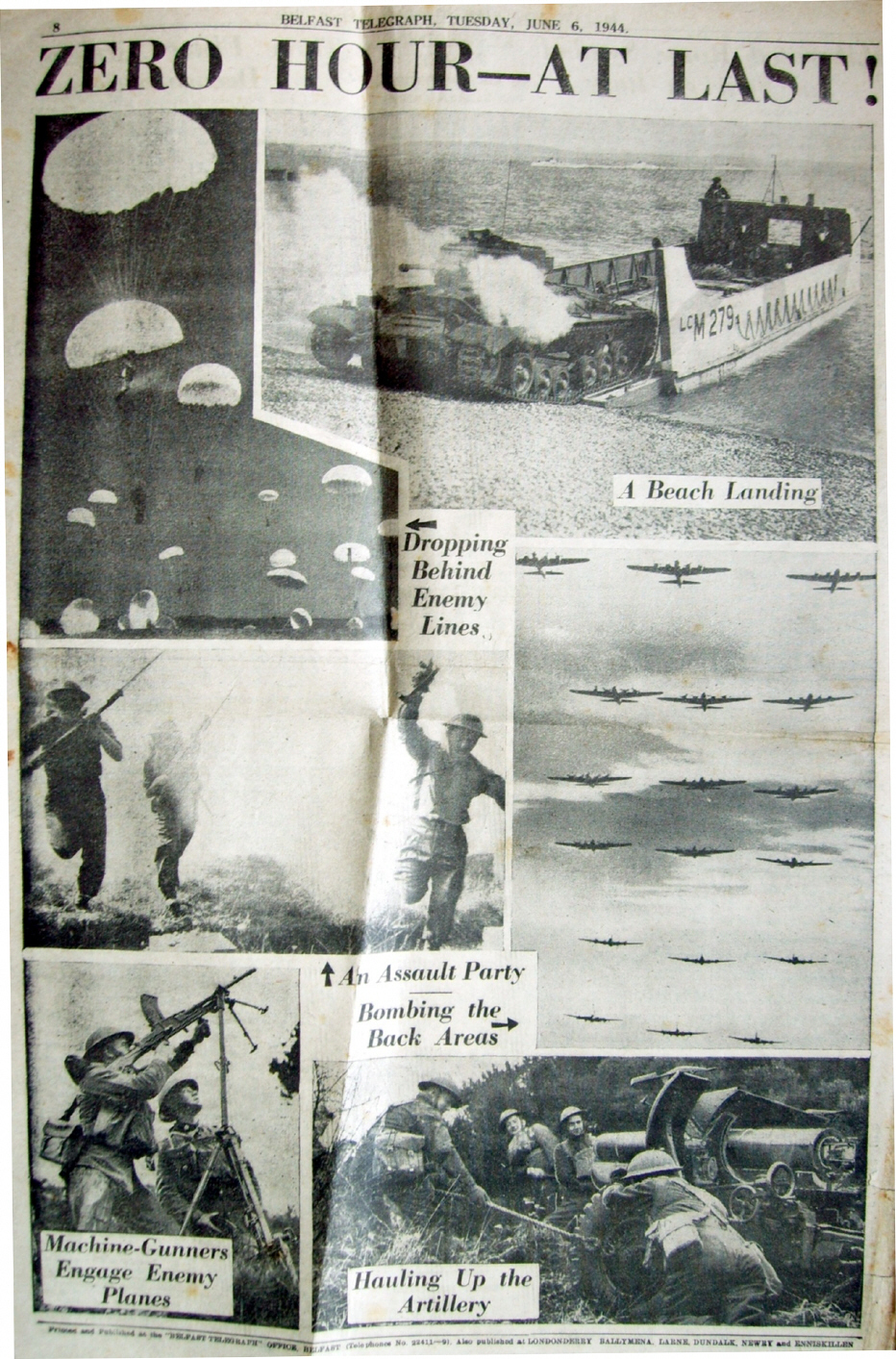
|
| |
|
complete 2.5.09
|
|